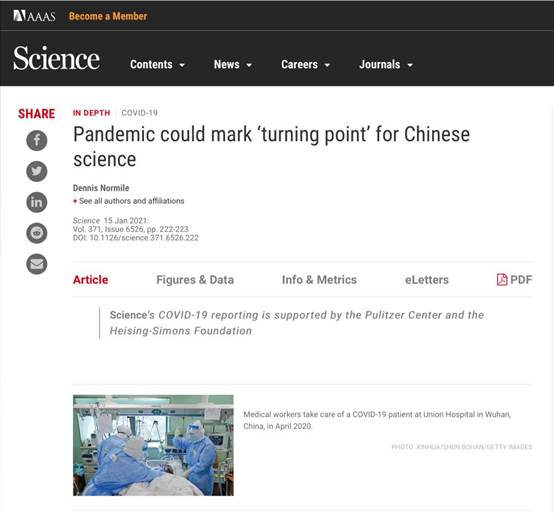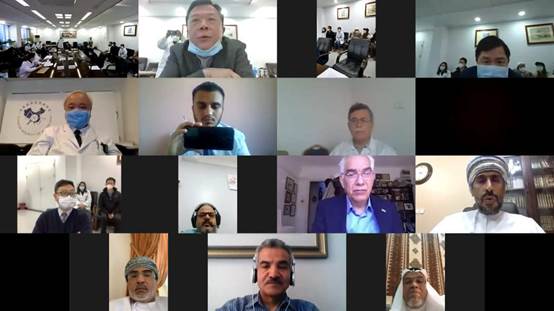On January 15th, Science, a leading international academic journal, published a news article titled Pandemic could mark ‘turning point’ for Chinese science (Vol 371, Issue 6526). The author, Dennis Normand, visited Wuhan and interviewed Professor Chen Jianguo, Vice President of HUST and Dean of Tongji Medical College in September 2020.


The article affirmed China’s remarkable achievements in controlling COVID-19, and mentioned the research results that were published online in the Lancet by Wuhan Jinyintan Hospital on January 24th 2020. The paper was recognized by Elsevier, the largest peer-reviewed literature database, as the most cited paper in the field in the first half of 2020. The article featured the fruitful achievements of our university through the papers that were published during the epidemic: “Researchers at Huazhong University of Science and Technology published well over 400 COVID-19 articles and reviews from January through June. The bulk came from the university's Tongji Medical College, home to four authors of the Lancet paper, and its large clinical network.”
The article quoted Chen Jianguo as saying that“Our doctors and nurses worked at the front line fighting against the epidemic,”, and thatthey also felt a responsibility “to share their experiences and treatment plans with colleagues.” According to the statistics of HUST Office of International Affairs, by September 2020, more than 70 online experience sharing meetings had been held in various departments, covering nearly 30 countries on six continents, affecting over a million people with HUST receiving widespread praise from our partners. This initiative promotes the sharing ofChinese experience and HUST solutions with the rest of the world, and greatly enhances the international influence of our school.

The author pointed out how our university leveraged "existing international ties" during the epidemic, citing the collaboration between Professor Wang Chaolong of the School of Public Health and Professor Lin Xihong of the Harvard T.H. Chan School of Public Health. The team's cooperative report powerfully showed that the epidemiological curve "rapidly tapered off" after a series of measures, such as isolation of cases, quarantining of contacts, and harsh lockdowns in several cities. The research dispelled doubts in some countries about whether the restrictions on isolation from China were “excessive”. “We in New Zealand learnt that this pandemic virus could be successfully controlled,” says Nick Wilson, a public health scientist at the University of Otago.
The article also indicated that despite political tensions, China and the United States collaborated more frequently on COVID-19–related papers than they had on papers in general in the previous 5 years, Jenny Lee and John Haupt of the University of Arizona reported in The Journal of Higher Education in November. Yet China's remarkable success at taming its outbreak meant the focus of research there began to shift after a few months. “There are almost no cases, so it's very difficult for us to start a good cohort study,” says Zhang Wenhong, an infectious disease specialist at Fudan University's Huashan Hospital.
When it comes to the source of the outbreak, the article pointed out that “U.S. President Donald Trump and some other Western politicians claimed that the virus had escaped from a laboratory at the Chinese Academy of Sciences' Wuhan Institute of Virology (WIV), but the scientific consensus is that the virus probably evolved in nature, possibly from a bat-borne virus.”
The article recognized China's rapid scientific development by quoting Edward Holmes, a virologist and evolutionary biologist at the University of Sydney who with Chinese colleagues published the first genome of the virus on 10 January 2020. “COVID-19 is perhaps a turning point for Chinese science: the point when their work really had global reach and they saw the value of sharing,” Holmes says. China's achievements in the fight against the epidemic have indeed caught the world's attention, while HUST, once at the center of the epidemic, has invested and contributed most to this fight in China among all Chinese universities.
Written by: Zhang Aoyi
Edited by: Andrew, Peng Yumeng
